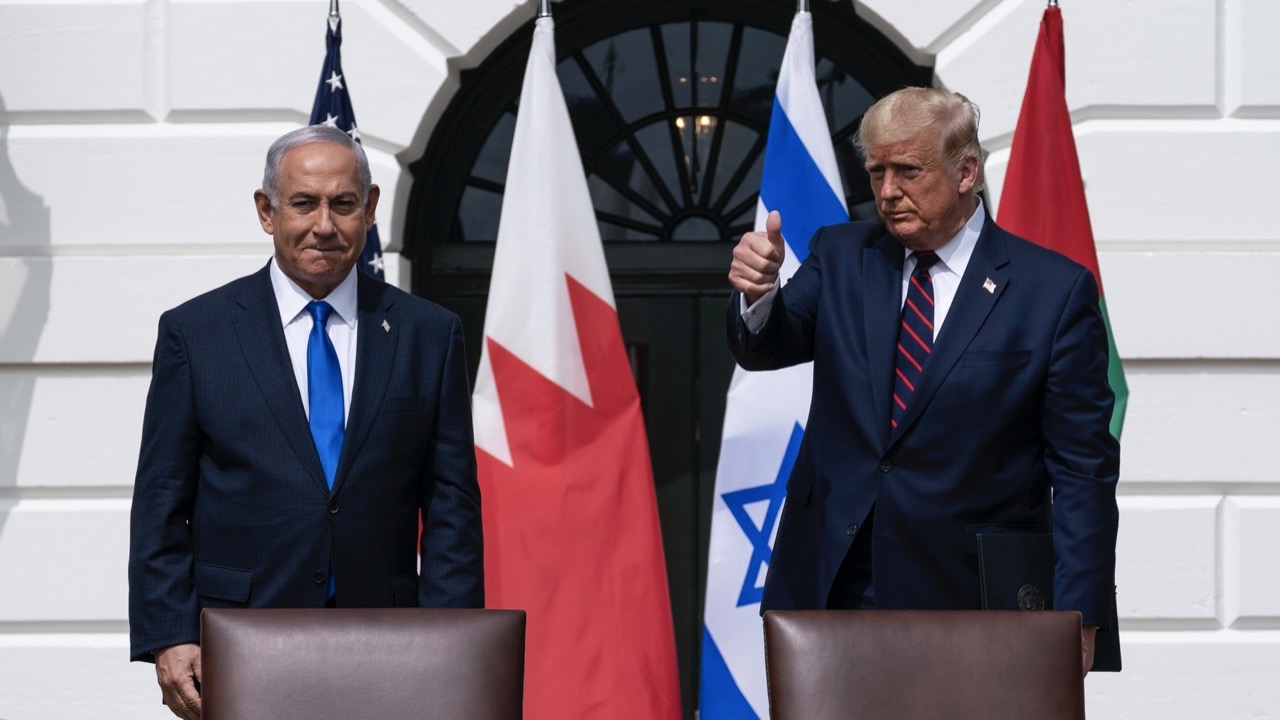Trump administration pushes for Palestinian relocation as Netanyahu visits White House amid fragile Israel-Hamas truce. (AP File)

- Trump's envoy calls Gaza reconstruction timeline 'preposterous,' pushing for Palestinian relocation amid truce talks.
- Netanyahu faces pressure from right-wing coalition to end truce, while Trump remains cautious about long-term peace prospects.
- Israeli PM's visit to Washington comes amid domestic challenges, including ongoing corruption trial and ICC arrest warrants.
Share
WASHINGTON — President Donald Trump’s Middle East envoy said Tuesday that a three to five year timeline for reconstruction of Gaza, as set out in a temporary truce agreement, is not a viable post-war plan for the battle-torn territory.
The renewed call by the Trump administration on Arab nations to relocate displaced Palestinians comes as Trump is set to meet with Israeli Prime Minister Benjamin Netanyahu at the White House later Tuesday.
“To me, it is unfair to explain to Palestinians that they might be back in five years,” Trump’s envoy Steve Witkoff told reporters. “That’s just preposterous.”
Egypt and Jordan, as well other Arab nations, have flatly rejected calls by Trump to relocate the territory’s 2.3 million Palestinians during post-war rebuilding of the territory.
But senior administration officials continue to press the case for relocation of Palestinians on humanitarian grounds.
“At some point we have to look realistically. How do you rebuild Gaza,” said White House national security adviser Mike Waltz. “What does that look like? What’s the timeline? These people are sitting with literally thousands of unexploded ordnance, in piles of rubble.”
Related Story: Israel’s Top General Resigns over Oct. 7 Failures, Adding to Pressure on ...
Truce Hangs in the Balance
The White House’s focus on reconstruction comes as the nascent truce between Israel and Hamas hangs in the balance.
The Israeli prime minister is facing competing pressure from his right-wing coalition to end a temporary truce against Hamas militants in Gaza and from war-weary Israelis who want the remaining hostages home and for the 15-month conflict to end.
Trump, meanwhile, remains guarded about the long-term prospects for the truce, even as he takes credit for pressuring Hamas and Israel into the hostage and ceasefire agreement that went into effect the day before he returned to office last month.
“I have no guarantees that the peace is going to hold,” Trump told reporters Monday.
Related Story: Netanyahu Postpones Cabinet Vote on Gaza Strip Ceasefire Deal
Focus on Hostage Deal and Normalization
The leaders’ talks are expected to touch on a long-sought Israel-Saudi Arabia normalization deal and concerns about Iran’s nuclear program, but hammering out the second phase of the hostage deal will be at the top of the agenda.
Since returning to office, Trump has called for relocating Palestinians from Gaza to neighboring Egypt and Jordan, even as Egyptian President Abdel Fattah el-Sissi and Jordanian King Abdullah II have rejected it. Saudi Arabia, the United Arab Emirates, Qatar, the Palestinian Authority and the Arab League have joined Egypt and Jordan in rejecting plans to move Palestinians out of their territories in Gaza and the occupied West Bank.
Yet Trump insists he can persuade Egypt and Jordan to come around to accept displaced Palestinians because of the significant aid that the U.S. provides Cairo and Amman. Hard-line right-wing members of Netanyahu’s government have embraced the call to move displaced Palestinians out of Gaza.
Netanyahu’s Domestic Challenges
Netanyahu arrived in Washington for the first foreign leader visit of Trump’s second term comes as the prime minister’s popular support is lagging. Netanyahu is in the middle of weekslong testimony in an ongoing corruption trial that centers on allegations he exchanged favors with media moguls and wealthy associates. He has decried the accusations and said he is the victim of a “witch hunt.”
Being seen with Trump, who is popular in Israel, could help distract the public from the trial and boost Netanyahu’s standing.
It’s Netanyahu’s first travel outside Israel since the International Criminal Court issued arrest warrants in November for him, his former defense minister and Hamas’ slain military chief, accusing them of crimes against humanity during the war in Gaza. The U.S. does not recognize the ICC’s authority over its citizens or territory.
Netanyahu said in a statement that the meeting with Witkoff and Waltz was “positive and friendly.”
The Israeli leader said he would send a delegation to Qatar to continue indirect talks with Hamas that are being mediated by the Gulf Arab country, the first confirmation that those negotiations would continue. Netanyahu also said he would convene his security Cabinet to discuss Israel’s demands for the next phase of the ceasefire when he returns to Israel at the end of the week.
Netanyahu is under intense pressure from hard-right members of his governing coalition to abandon the ceasefire and resume fighting in Gaza to eliminate Hamas. Bezalel Smotrich, one of Netanyahu’s key partners, vows to topple the government if the war isn’t relaunched, a step that could lead to early elections.
RELATED TOPICS:
Categories

Iran Retaliates Against Israel and US Allies



















